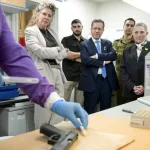Jerusalem, 21 July, 2025 (TPS-IL) — Despite a global downturn in climate-tech funding, Israel’s innovation ecosystem is pushing back — showing not only resilience, but early signs of renewed growth.
A new report by the Israel Innovation Authority and PLANETech reveals that global investments in climate technologies dropped by 41% between 2023 and 2024. PLANETech, a nonprofit initiative by the Israel Innovation Institute and Consensus Business Group, focuses on advancing climate-tech innovation.
“The ecosystem is strong,” said Rotem Trivitsky, CEO of PLANETech, speaking at the report launch on July 15. “Even though total investments are down, Israeli companies are still raising funds. They’re still growing. There’s resilience and continuity.”
In Israel, investment levels also declined — from $1 billion to $613 million, a 39% drop — and the number of funding rounds fell from 135 to 90. Yet the story behind the numbers is more complex: over 90% of Israeli climate-tech rounds still included foreign investors, signaling continued global confidence in the local ecosystem.
Indeed, the number of climate-tech companies in Israel has reached 946 — with 49 new startups founded in the past year alone. Notably, 58% of them are still at the pre-seed or seed stage, suggesting a particularly dynamic early-stage pipeline.
Public funding has played a key role in sustaining momentum. In 2024, the Israel Innovation Authority invested a record $105 million in climate-tech — part of a broader $257 million three-year plan. Between 2021 and 2023, Israeli startups also secured €105 million through the EU’s Horizon Europe program.
The event also served as a launchpad for 105 emerging startups, spanning fields such as energy, water, nature restoration, mobility, food systems, and beyond.
“This marks a true milestone,” said Dan Bakola, ecosystem manager at PLANETech. “It’s a testament to the innovation, resilience, and forward-thinking mindset of this community — especially in such uncertain times.”
Yaroslav Efimov, Head of Science and Technology at PLANETech, emphasized the need for stronger support mechanisms.
“Collaboration is the key to unlocking Israel’s full climate-tech potential. We need more early-stage investments, more pilot opportunities, and smoother paths to bring lab technologies into the real world.”
Among the standout ventures showcased at the launch were FireDome, which offers wildfire protection through smart capsules that disperse fire retardants across a quarter-mile radius; AgriPass, a startup developing AI-powered weeding robots that aim to reduce soil degradation while eliminating the need for herbicides; and Starstone, a company tackling the high emissions of the cement industry — responsible for 7–8% of global CO₂ — by producing a bio-cement alternative through microbial fermentation.
Trivitsky stressed the importance of global visibility. “Roughly 10% of startups in our ecosystem launched during a period of global disconnection — and many remain invisible to the international community. That’s exactly the gap we’re working to close.”
PLANETech’s global climate-tech conference in Tel Aviv is scheduled for December 9.
































